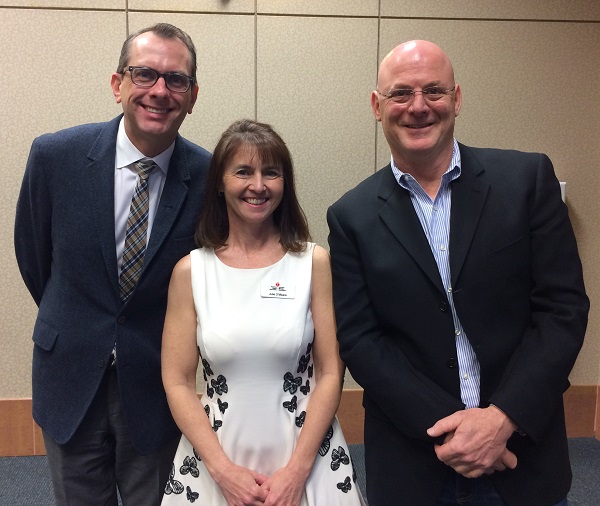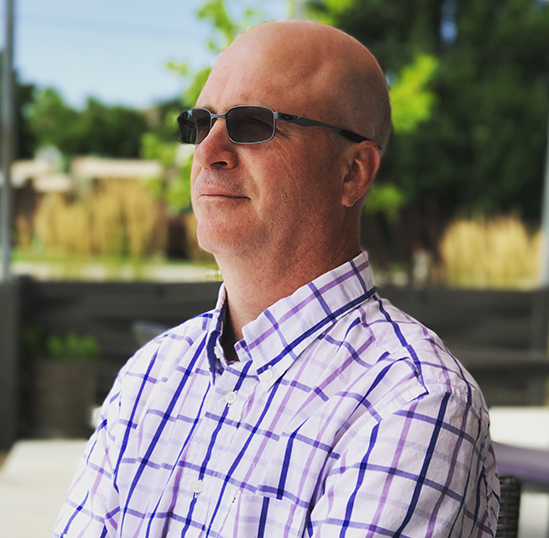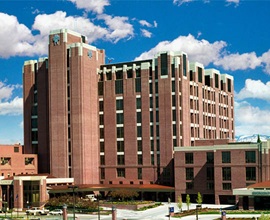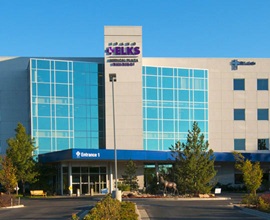Boise Woman Grateful for Fast Care Following Stroke

Julie O’Meara is accustomed to delivering messages about health education to the public. After all, she is the executive director of the Idaho Division of the American Heart Association and the American Stroke Association.
Since suffering a stroke in October, her message has become a lot more personal: Listen to your body. Heed any warning signs. And when it comes to your health, it’s OK to be selfish.
“I exercise frequently, and I’ve taught aerobics for most of my life,” O’Meara said. “About five years ago, I stopped teaching aerobics, and that was regret No. 1 … just that I stopped putting myself first and taking care of myself. I just kept putting myself last, and I think that’s what put me in the hospital: putting myself last over and over and over.”
O’Meara said she never even entertained the idea of having a stroke.
“I was very healthy, physically,” she said. “My biometric numbers are, really, perfect. … But I know that I had a lot of stress, and I know that I wasn’t managing that well, at all.”
O’Meara was trick-or-treating with her daughter last Halloween when she first lost vision in her right eye.
“I kept thinking, ‘Once trick-or-treating is over I can go home and lay down,’” said O’Meara, who was 46 at the time. “If I had done that, I probably would have had a catastrophic stroke in my sleep.”
Instead, a mother who was with O’Meara that night suggested she needed to go to the hospital.
The next few days of O’Meara’s life are a blur. Doctors at St. Luke’s discovered her carotid artery had dissected. A stent was inserted, but she eventually suffered a stroke.
Dr. John Perl, a St. Luke’s neuroradiologist, and Dr. Edward Duckworth, a neurosurgeon, collaborated on O’Meara’s care. Dr. Duckworth performed a cerebral bypass procedure.
O’Meara sums up those few days succinctly.
“So, they saved my life and that was it,” she said.
In reality, though, she had months of rehab ahead of her, including care at St. Luke’s Rehabilitation in Boise.
“I had amazing care,” O’Meara said. “It’s amazing how they all coordinate as one team. The care I received was with dignity and compassion. … For a while, I couldn’t go to the bathroom, feed myself, nothing. And the care was incredible. Elks Rehab was phenomenal.”
Today, O’Meara considers herself fully recovered.
“I do thing that I’m incredibly lucky,” O’Meara said.
Said Dr. Duckworth: “I think she is definitely a success story.”
It’s a story that might have had a different outcome just a few short years ago. Dr. Duckworth moved to Boise from Houston about a year and a half ago. Much of the motivation behind his move was to improve the level of stroke care in the Treasure Valley.
“I offered her a treatment that previously wasn’t available at St. Luke’s or in Boise,” Dr. Duckworth said of the bypass procedure. “It’s a very technically demanding procedure. I did a lot of extra training to learn it, to master it.”
Dr. Duckworth said he has seen tremendous advances in stroke treatment in just the past five years, and he is proud to see those advances implemented at St. Luke’s.
“St. Luke’s now offers the highest level of treatment for stroke,” Dr. Duckworth said. “We now have three fellowship-trained neuro and vascular specialists at St. Luke’s who specialize in the treatment of strokes. So, we offer the highest-level, cutting edge stroke treatment here, including things like bypass.”
And while O’Meara’s outcome was a success, Dr. Perl and Dr. Duckworth agree her situation provides some important lessons for everyone.
“The one thing people need to know is that stroke can happen to young people, and Julie is young,” Dr. Perl said. “And the symptoms in young people are just as relevant as they are in the elderly.”
Both doctors and O’Meara emphasize the importance of paying attention to those symptoms and getting medical attention.
O’Meara looks back and recalls a broken blood vessel in her eye and a bloody nose she got while in the shower. She thinks those incidents were warning signs.
“Pay attention to your body, and if something feels off, get it checked out now,” she said. “Don’t blow it off. Got get it checked out.”
It’s an important message she will relay again and again in her role as a health educator.
And perhaps the most important message of all during Stroke Awareness Month is this: If you think someone is having a stroke, always remember to think F.A.S.T: Facial drooping, Arm weakness, Speech difficulties and Time to call emergency services.
“If you think you are having a stroke, don’t delay,” Dr. Duckworth said. “Seek medical attention right away, because we do have all these treatments now that are highly effective.”About The Author

Chris Langrill is a writer and copy editor for the St. Luke’s Communications and Marketing department.





